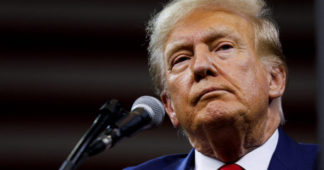Ron DeSantis says Gaza residents ‘are all antisemitic,’ as Tim Scott also opposes taking Gaza refugees
The Associated Press
Republican frontrunner Donald Trump on Monday vowed to bar refugees from Gaza and immediately expand the Muslim travel ban enacted during his presidency if he wins another term at the White House.
Speaking to supporters in Iowa, Trump pledged to bar the entry of refugees from Gaza fleeing Israel’s retaliatory strikes after the surprise Oct. 7 attack by Hamas, just as he tried to bar citizens from seven Muslim-majority countries with a 2017 executive order.
Speaking to supporters in Iowa, Trump said that if he wins the 2024 presidential election and returns to the Oval Office, he will immediately begin “ideological screening” of all immigrants and bar those who sympathize with Hamas and Muslim extremists.
Trump — whose path to the White House is complicated by four criminal indictments — also said he would send immigration agents to “pro-jihadist demonstrations” to identify violators, while taking umbrage at pro-Palestinian demonstrations that have taken place on some college campuses.
“Under the Trump administration, we will revoke the student visas of radical anti-American and antisemitic foreigners at our colleges and universities and we will send them straight back home,” he said.
Trump’s audience in the Horizon Events Center in Clive, Iowa, cheered his proposals. Information technology specialist Ritu Bansal, 31, said she supported Trump, but hoped he would show compassion for the people of Gaza.
“In my opinion, the U.S. government should care for the victims of the Hamas attack on Israel and the civilian victims in Gaza,” Bansal said. “The U.S. can care for both.”
Contentious immigration policies
The proposals, while legally questionable, would mark a dramatic expansion of practices that drew alarm from immigrant rights and civil liberties activists, but helped him win the Republican nomination in 2016.
In the first days of his presidency, the Trump administration rushed an executive order that attempted to bar immigrants from several Muslim-majority countries, flat-footing several government agencies and leading to chaotic scenes at airports. The order was met with fierce opposition and only legally approved by the Supreme Court after two rounds of modifications.
By one count, the Trump administration made more than 400 immigration policy changes during his term, even drawing criticism from business leaders, as a freeze was imposed on new green cards for high-tech and seasonal workers.
Most controversially, the Trump administration until 2018 separated hundreds of migrant children who arrived at the southern border from their families. Faulty tracking systems caused many to be apart for an extended time or never reunited with their parents.
On Monday, a proposed court settlement was announced that would see the U.S. government barred from enacting immigration policies that separate parents from children for eight years, other than under the limited scenarios involving potential danger that previously existed. The settlement between the Joe Biden administration and the American Civil Liberties Union will require approval from a judge.
According to figures released by the Department of Homeland Security in February, 3,881 children were separated from their families from 2017 to 2021. About 74 per cent of those have been reunited with their families.
Criticism of Biden, not Israel
Trump is not an outlier among Republican candidates on the subject of Palestinian refugees from Gaza.
Florida Gov. Ron DeSantis suggested the U.S. should not accept refugees from Gaza while speaking at a campaign event in Iowa on Saturday, arguing they “are all antisemitic.”
Sen. Tim Scott of South Carolina, also a GOP candidate, said Monday at a campaign stop that he agreed somewhat with DeSantis.
Scott said not accepting refugees from Gaza is “the right decision,” because the president cannot determine in the middle of the conflict “who is safe to bring in, who’s not safe to bring in.”
“I don’t think that they’re all antisemitic. I just can’t tell you who’s who,” he said.
Among the candidates, former UN ambassador Nikki Haley offered a contrasting view. She told CNN on Sunday that “America’s always been sympathetic to the fact that you can separate civilians from terrorists. And that’s what we have to do.”
While some ministers in Israeli Prime Minister Benjamin Netanyahu’s government have been confronted by angry Israelis since the attack, there has been little criticism of Israel from Republican presidential candidates.
Scott on Monday praised Netanyahu for showing what he characterized as “patience” and “humanity” in response to the Oct. 7 attack.
“One of the first things that Israel’s done is they waited,” Scott said Monday at an event held at Georgetown University in Washington, D.C.
Last week, Scott blamed the U.S. administration for the violence.
“While Hamas carried out these attacks, Joe Biden has blood on his hands,” Scott said in the speech. “His weakness invited the attack.”
DeSantis, meanwhile, criticized the Biden administration for not being more proactive in arranging flights out of the country for stranded Americans in Israel.
“There was a devoid of leadership [sic] so we stepped up and led,” DeSantis said, referring to a flight Florida arranged with a nonprofit organization that arrived in Tampa on Sunday night.











